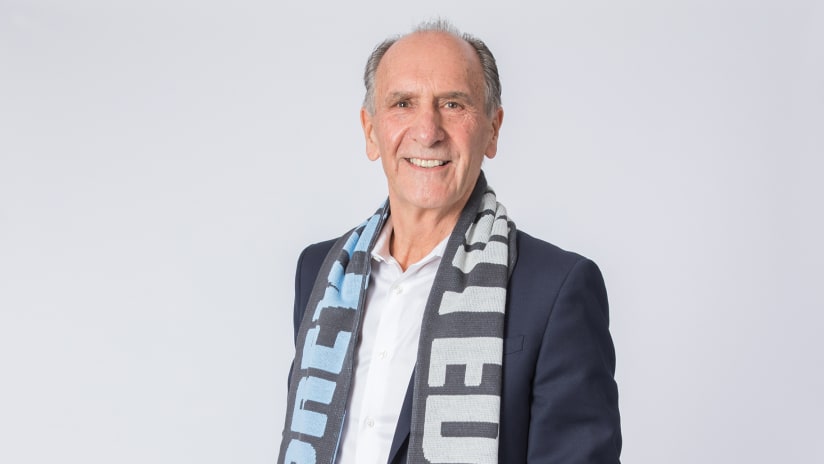Chris Wright joins Minnesota United as the organization’s first CEO after 26 years with the Minnesota Timberwolves and Minnesota Lynx, including the last 13 years as President. Growing up in England, though, his first love was soccer, and it was only after a — by his account — brief career as a player and then a coach and manager that he came stateside to work in the Major Indoor Soccer League. He eventually made his way to Minnesota to serve as the general manager of the Minnesota Strikers.
Here, Wright talks about his playing experience in his home country, the way the game has changed, the growth of MLS and a little bit about how he spends his minimal amount of downtime.
What were your first experiences with soccer growing up?
Over there, you play for your school team, a club team, etc. and I was fortunate enough to go to a schoolboys' trial with pro scouts there. And as a young man I was picked up by Hull City so I was part of their junior squad for about three years. I had the opportunity to learn what the professional game was all about — training with the first team, training with the second team and then on their junior team.
A really good friend of mine, Stuart Pearson, who I went to high school with — he was the guy who made it big time from that club. He was transferred to Manchester United for the biggest fee that Hull City had ever gotten for a player at that time. So I became a huge Manchester United fan because of that, because I was really following his career. After I left the juniors, I went to Carnegie College of Physical Education and we won the English Colleges Shield, which is like going to the Rose Bowl. Over there, you don't have as many people in the stands but at the same time it's the two top colleges in the country. I saved a penalty in the final game. So I had a great college career.
And then when I came out, I played for a couple of non-league teams. Played for Aylesbury United, Hemel Hempstead, but decided that coaching was really the way that I wanted to pursue a career inside of the game. So I did my English Full Badge — which is now the UEFA A license — and at the ripe old age of 22, got my full badge.
As a former goalkeeper, do you subscribe to the belief that ‘keepers have to be a little crazy?
Crazy or aggressive or dominant. One of the reasons I love Bobby [Shuttleworth]'s game is that he's a big strong guy. He reminds me a little bit of Joe Corrigan, a goalkeeper that used to play for Manchester City many, many years ago. But Bobby has great reflexes as well. Not only is he a dominant goalkeeper in the air, he's loud. And goalkeepers are always taught, even when I was with Hull City, that you've got to dominate the six-yard box, but you've got to own the 18-yard area.
How do you feel soccer in America has evolved or changed since you came over in the ‘80s?
There's a couple of ways to benchmark that. When I got to Pittsburgh, there were about 2,000 kids playing the game in the city. When I left, there were 27,000. We were in a football city with the Steelers. But there was also the University of Pittsburgh, as well as the Pirates, who were just huge.
But Edward J. DeBartolo Sr. owned the team and gave us a lot of resources to be able to go out and put a very competitive team together. Owners back in the day probably spent and paid too much to players, but they were very, very competitive with each other. We had an incredible team that had to compete in this incredible sports marketplace. And we did it through unique marketing and unique efforts in terms of grassroots reaching out into the community.
The MLS right now, though, is in a different place. Don Garber has taken this league to a completely different level and Minnesota United is taking its place inside of the 22 teams that are playing today. We’re averaging 21,000 for the last five games, three games over 22,000. This is a movement and to a degree it's a lot of those kids that played and have now become adults and they've got kids who are playing. They were brought up in the game, they understand the game, they're very intelligent around the game.
When you get the opportunity, what kind of things do you like to do away from pro sports?
First of all, in professional sports, you're always on call. I don't care what role you have, you're always on call. You're on this thing 24 hours a day, 365. That won't change when I come here, but I have a family that I love dearly. My wife of 34 years, Walla, is my soulmate — she's my partner in everything and actually she will be involved in the club with me. She loves the game. We came together through the game and we have three kids, all of whom played.
So my hobbies are around my family and I'm a big believer in creating memories. We have a trip every year where we invite all of our family to go on that trip with us. That's when I close down and I try to spend real, quality time with my family.
I would say, though, that the game does not disappear too far from those trips. Since 1990, I have been to every World Cup and my wife has been along the way for all of those and my family has been to many of them. Whether it was in Rio or whether it was in South Africa or whether it was Germany or Japan, we've been doing that together.
What attracted you to this position with Minnesota United?
For me to have this opportunity, going back to my roots now at the back end of my career, this is a legacy play for me. I want to be part of the legacy of Minnesota United. This legacy drew me to it. When we walk into Allianz Field and we play our first game in that stadium, with 20,000 in there with the greatest atmosphere in sports in this marketplace, then I'm going to have goosebumps on top of goosebumps on top of goosebumps. I want to be part of that.








